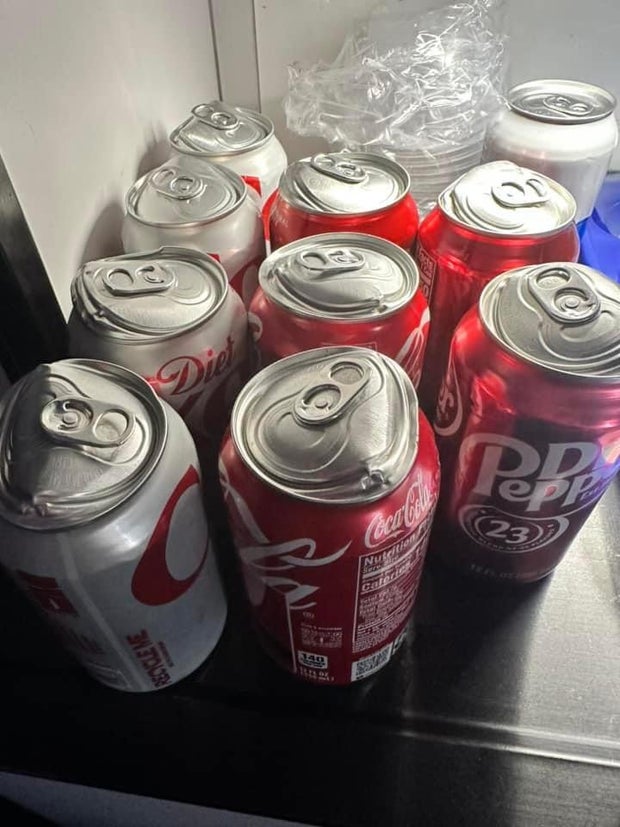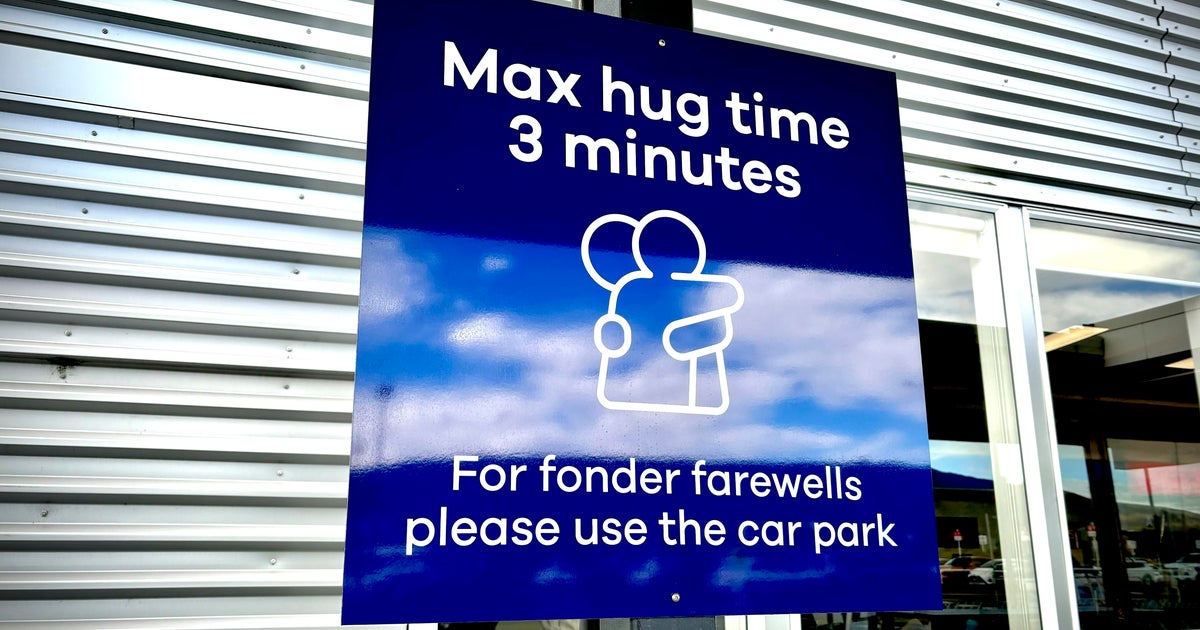CBS News
Summer heat is causing soda cans to burst on Southwest Airlines flights, injuring flight attendants

The intense summer heat is causing soda cans to burst after being loaded on some Southwest Airlines flights, the airline confirmed to CBS News on Wednesday.
Airline officials say they are aware of a series of incidents where cans of carbonated drinks have ruptured, often while being opened, resulting in an onboard mess and reports of about 20 injuries to employees so far this summer.
There have been a few hand injuries reported by flight attendants because of the issue, including one that resulted in stitches. Southwest says the injury reports are similar to last year. The issue is generating more focus this year because it appears, at least anecdotally, to be occurring more frequently this summer.
Southwest Airlines officials say they are implementing measures to address the issue, including at several of its hotter provisioning locations such as Austin, Dallas, Houston, Phoenix, Las Vegas and Sacramento.
Chris Perry, a Southwest spokesperson, said the airline has been “communicating to our employees about it throughout the spring and summer.”
“We’ve developed a mitigation plan to address it,” Perry said.
The issue may have to do with how Southwest stores and loads drinks on planes in extreme heat. Unlike other airlines, Southwest does not stock perishables on board, so it is not required to use air-conditioned catering trucks to deliver meals and drinks to the aircraft. Instead, drinks on Southwest provisioning trucks are more frequently exposed to outside temperatures.
In an internal email obtained by CBS News from July 12 sent to flight attendants titled “Hot & Bursting Cans: Provisioning Procedural Changes,” company leaders said finding “viable solutions to bursting hot cans is our top priority.”
The message, from Rachel Loudermilk, managing director of base operations, and Matt Sampson, provisioning director, tells the airlines’ 21,000-plus flight attendants that “none of us are satisfied that we are still seeing reported events.”
The email lays out a series of changes Southwest has undertaken, especially in cities with hot temperatures, to address the problem since the beginning of the summer, including stocking fewer cans on provisioning trucks to limit the amount of time the cans spend on the flight line (and in the heat), placing carbonated drinks in coolers on trucks in hot weather locations, monitoring truck and can temperature with thermometers during shifts, and “not boarding product when the outside temperature reaches levels known to elevate the risk of bursting cans.”
The airline confirmed it has also told employees not to open cans that are noticeably hot to the touch or appear deformed due to heat exposure.
But the email adds that the airline has come to “recognize that additional immediate solutions are necessary” and are now considering making additional changes in Phoenix and Las Vegas, including halting the onboarding of cans with a temperature over 98 degrees (which would be checked with heat guns on the provision trucks). Non-alcoholic beverages that top 98 degrees would be returned to the warehouse to cool. The airline is also considering positioning refrigerated trailers at its warehouses to keep cans cool before they are loaded onto provisioning trucks to be brought to the flight line.
The email says Southwest began testing air-conditioned provisioning trucks this month and is having conversations with Coca-Cola to analyze the viability of the current cans and to consider alternatives, including a 7.5-ounce option. The airline currently stocks traditional 12-ounce soda cans.
As part of the testing in Arizona and Nevada, cans are being marked so they can be identified if they originated from refrigerated or non-refrigerated trucks.
Perry, the Southwest spokesperson, stressed that the airline is taking the issue seriously.
“We are investigating the issue and looking at changes to ensure safety for our employees and customers in the midst of extreme temperatures and climate change,” he said.
TWU Local 556, the union that represents Southwest Airlines flight attendants, did not respond to multiple requests for comment, but pictures of the burst cans are circulating online in postings to Facebook groups dedicated to Southwest employees. Many posts express frustration and concerns over safety. Some noted the cans that burst did not appear to be hot at the moment.
Southwest operates about 4,200 flights a day.
CBS News
Behind the Harris, Trump gender gap as 2024 Election Day gets underway

Watch CBS News
Be the first to know
Get browser notifications for breaking news, live events, and exclusive reporting.
CBS News
Benjamin Netanyahu fires Israel’s defense minister Yoav Gallant

Watch CBS News
Be the first to know
Get browser notifications for breaking news, live events, and exclusive reporting.
CBS News
3 smart gold investing moves to make right now

Getty Images/iStockphoto
Gold has proven itself as one of the most resilient assets of the year, displaying remarkable growth so far in 2024. Starting the year at $2,063 per ounce, the price of gold is now sitting over $2,748 per ounce, slightly below its recent record high. As a result, investors who bought gold earlier this year — or even just a few months ago — have already reaped notable returns, a big benefit of this exceptional price trajectory.
Historically, though, gold’s value tends to increase more gradually, offering stability rather than swift gains. Still, most analysts believe the current upward trend could hold, driven by factors such as economic uncertainty, central bank policies and geopolitical tensions. So while gold’s current upward trajectory might be uncommon, it could persist for the near future, making the precious metal an attractive choice for both new and seasoned investors.
But if you’re considering entering the gold market or adjusting your existing precious metals holdings, there are a few strategic moves you can make to help maximize the potential benefits of gold investing in the current environment.
Diversify your portfolio by investing in gold today.
3 smart gold investing moves to make right now
If you’re planning to invest in gold in today’s market, consider making these moves:
Add physical gold to your portfolio
During periods of rising gold prices, acquiring physical gold can be particularly advantageous, despite having a higher entry point than other gold options. That’s because physical gold offers several distinct benefits that become especially valuable in a bullish market. For starters, when you own physical gold, whether in the form of gold bars or coins, you have direct ownership of a tangible asset that isn’t subject to counterparty risk or financial system vulnerabilities.
Physical gold that is purchased during price uptrends also typically benefits from momentum in the market. While past performance doesn’t guarantee future results, strong upward price movement typically attracts more investors, potentially creating additional demand that could further support prices. The tangible nature of physical gold also provides a psychological benefit, as having direct possession of your investment can offer peace of mind during periods of market volatility.
Find out what your gold investing options are here.
Consider your digital gold options
While physical gold has its merits, digital gold investments, particularly gold stocks, often provide amplified returns during gold bull markets. That’s because mining companies typically see their profits increase at a faster rate than the price of gold itself due to their operational leverage. For example, if a mining company’s cost to produce an ounce of gold remains relatively stable while the selling price increases substantially, the company’s profit margins expand significantly.
As a result, gold mining stocks, especially those of well-established companies with strong production profiles and healthy balance sheets, can offer exposure to gold’s price movements while also providing additional benefits like dividend payments. And gold exchange-traded funds (ETFs) that track either the price of gold or baskets of gold mining stocks offer another convenient way to gain exposure to the sector, often with lower transaction costs and greater liquidity than physical gold.
Make sure you’re investing the right amount
Perhaps the most crucial decision in gold investing isn’t just whether to buy, but how much to allocate to this precious metal. Financial advisors typically recommend limiting gold exposure to a maximum of 10% of your overall investment portfolio. This measured approach serves multiple purposes in your investment strategy.
The 10% ceiling allows you to benefit from gold’s potential upside while maintaining sufficient diversification across other asset classes. This balance is essential because, while gold can provide valuable portfolio protection during certain market conditions, it’s important to remember that other assets — like stocks, bonds and alternative investments — typically provide different types of returns and benefits, including regular income through dividends or interest payments.
Maintaining this disciplined allocation helps ensure that your portfolio remains well-balanced and aligned with your long-term financial goals. Even during periods of strong gold performance, resisting the temptation to overweight your portfolio toward gold helps manage risk effectively. Remember, the primary role of gold in most portfolios is to serve as a hedge against uncertainty and inflation, not necessarily as the main driver of returns. That’s just an added bonus.
The bottom line
While gold’s recent price performance has caught many investors’ attention, success in gold investing still requires a thoughtful, measured approach. By considering physical gold ownership, exploring your digital gold options and maintaining appropriate allocation levels, you can potentially benefit from gold’s current strength while managing your overall portfolio risk effectively.











